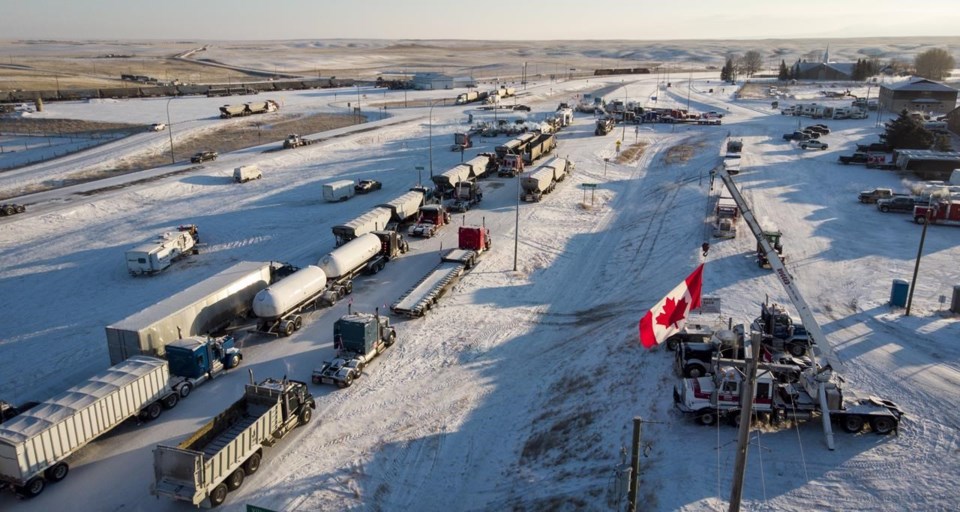An RCMP officer has described the tenuous, and often fraught, relationship police forged with protesters as they tried to end the COVID-era border blockade in Coutts, Alta.
Sgt. Greg Tulloch continued his testimony Wednesday at the trial of Alex Van Herk, Marco Van Huigenbos and Gerhard (George) Janzen, who are charged with mischief over $5,000.
Crown prosecutors have told jurors they intend to prove the trio spearheaded the protest that tied up cross-border traffic between Alberta and Montana for two weeks in early 2022 in protest of pandemic restrictions.
Tulloch said efforts were made to convince the truckers to pull up stakes and leave when he first arrived on Feb. 1. He said the three accused were identified as leaders and he had most of his dealings with Van Huigenbos.
At one point, Van Huigenbos informed police a number of individuals driving logging trucks were determined to make their way past a police checkpoint to join those already in Coutts, and that if the request wasn't granted "things could go south in a hurry."
"There was also concern about safety, that if other actors are introduced the situation could become problematic," Tulloch said.
"Oftentimes, we see that groups such as that attract people not particularly concerned about what the message of the protest is. They just come to cause chaos, either through violence or by introducing all sorts of other messages that are not the same as what the group is intending to communicate."
Police agreed to let the trucks come in. But at the last moment, Van Huigenbos told Tulloch to delay the action because the highway had been closed again.
Tulloch described driving into Coutts and having a semi pull in front of him and his partner. That led to a heated exchange with the driver, as other people gathered nearby.
"Eventually Marco and George came to the scene as well and intervened, allowing for that vehicle to move back out of the way and for us to continue on," he said.
Tulloch said the highway was locked down and "totally impassable." He said Van Huigenbos asked if the logging trucks would be allowed in if the highway reopened, and he replied they wouldn't.
"He made it very clear that he is the face of the organization and he put it out there to the people who rely on him that if they're not going to listen to him, he's going to walk away from the situation entirely and no longer have anything to do with it," Tulloch told the jury.
"He said, 'if we don't get those trucks through fast, I will lose the trust of my people. That will put us back four days.'"
Tulloch said he returned for a second tour in Coutts on Feb. 9 and the situation had worsened.
"It was no longer porous. It was completely sealed."
He said there appeared to be some new people on the scene.
Tulloch told court they looked different and were wearing camouflage and vests. He said Smuggler's Saloon, a gathering point for the protesters, felt more like a military installation.
Tulloch said Van Huigenbos brushed off his concerns, saying they were only dressing for the weather.
Another problem popped up on Feb. 12, when police noticed two large excavators had been dropped off near the highway, midway between Coutts and Milk River.
Tulloch said the two men were told to remove both machines but, after making a call, they only moved them a short distance away.
"Either they were to be parked up the highway, thus becoming much less movable than the tractors or semis that were already blocking further south, or they might be used to actually dig up the highway," Tulloch said.
"Either way, that had to be avoided."
Tulloch said he tried to reach Van Huigenbos to get the excavators removed, but didn't hear back from him immediately. During that time, police decided to disable both machines.
"It's all done now," Tulloch said in a text.
Van Huigenbos replied he hoped the RCMP knew how to do that without wrecking the equipment.
This report by The Canadian Press was first published April 10, 2024.
Bill Graveland, The Canadian Press



